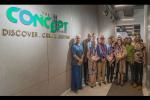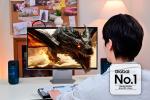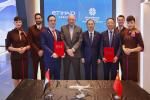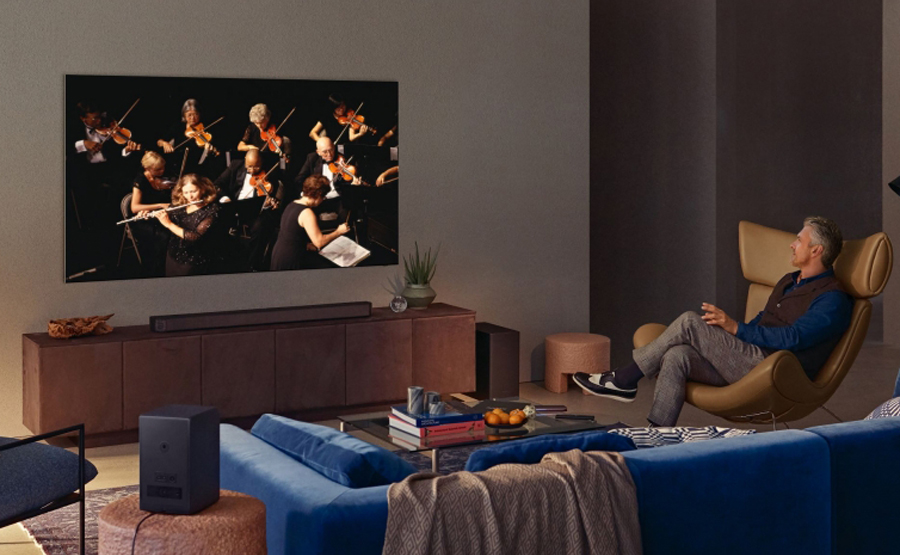The flagship displays were designed to analyze both the size of the space where they sit and how they’ve been installed in order to calibrate sound to its optimal settings.
The TVs use that information to pump out realistic, object-tracking sound through their eight total speakers.
SpaceFit does spatial analysis daily to optimize sound settings
Today, with more users watching TV in more places, including living rooms, workrooms, bedrooms, terraces and more, both sitting up and lying down, and at different times of the day, our viewing habits are changing.
Now, more users are customizing their viewing experience based on their living environment.
With this in mind, the developers focused on creating technology that would automatically analyze users’ viewing environments to ensure that they’re always enjoying the best possible sound.
The result is SpaceFit, a feature that automatically checks for changes in your living space once a day and calibrates sound settings accordingly.
This industry-first technology was made possible thanks to innovations that were based on a myriad of data and AI technologies.
From sound-absorbing areas, such as what are referred to in sound engineering as ‘dead rooms,’ to acoustically reflective spaces, the team considered both extremes in terms of viewing environments.
OTS Pro uses eight speakers to produce 3d sound from all corners of the screen
Content is beginning to make use of a wider range of sound channels, and users’ preferred ways of enjoying that content are also changing.
As home entertainment expands and both wide screens and multi-channel sources with immersive formats like films become more popular, it’s becoming commonplace for multiple people to enjoy the same content together.
The key here is to widen the ‘sweet spot’ – the location from which users can enjoy optimal sound even at the outside edges of the screen.
Object Tracking Sound (OTS) technology, a feature that tracks the movement of objects onscreen using the TV’s multi-channel speakers, is allowing Samsung to take users’ enjoyment to the next level.
Neo QLED 8K includes an enhanced version of the technology, OTS Pro, and adds two center speakers to previous models’ six-speaker setup, for a total of eight.
When an object onscreen moves, the speaker located in the optimal spot for expressing the movement produces sound, matching what the viewer sees on their screen.
The immersive sound setup enriches the left and right stereo experience and the 3D effect, taking the viewing experience to new heights by making the user feel as if they were standing in the middle of the action.
Making use of each and every piece of an ultra-slim design
The Infinity Screen, a unique aspect of Samsung’s TV design, maximizes immersion by making bezels nearly invisible.
It also posed a unique challenge for the developers, requiring them to explore how to best mount multiple speakers within the device’s slim form.
It’s just one of Neo QLED TVs’ many innovative, out-of-the-box design elements.
To help accommodate for panels becoming thinner and thinner, components that used to serve basic functions have been given new roles.
Delivering rich, realistic sound
The developers have also gone to great lengths to gain a deeper understanding of the content users enjoy as part of an effort to provide better sound performance.
For example, when analyzing sports content, they focus on reproducing the sound of the crowd, while for music, they try to create a stable sound stage.
For movies, they conduct constant analysis to ensure that dialogue comes from the center of the screen.
Samsung TVs have led the global market for 16 years running, and the user data that the company has accumulated thus far has been an invaluable asset.
As countless families across the world use Samsung TVs, the ubiquity of the company’s displays offers an opportunity to think about what’s next.
Sungjoo Kim hinted at what Samsung has in store.
In response to an ever-growing flood of content, the developers are committed to helping Samsung TVs deliver a sound experience that’s as close to reality as possible.
Screens are getting bigger, designs are getting slimmer, and content is becoming more varied.
Keeping pace with trends, increasing speaker channels and doing so in three dimensions, and advancing our AI technologies to allow channels to better correspond to one another will bring us closer to delivering realistic sound.
This may ultimately lead us into an era where you do not need a remote control to adjust sound settings.
The Samsung Neo QLED 8k range is available at authorized partners Softlogic, Singer, Singhagiri, Damro and Samsung e-Store.























